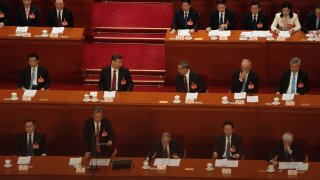Deterring Foreign Election Interference
Recent revelations of Chinese interference in Canada’s political system should be a warning to the United States and other democracies.
For some time now, the West has leapfrogged from deterrence failure to deterrence failure. Not merely against mass military action, such as Russia’s seizure of Crimea or its subsequent war for the rest of Ukraine, but against political warfare conducted by members of the loose anti-Western coalition of states (China, Russia, and Iran) waging unfriendly competition against the liberal democracies.
Russia famously, albeit sloppily, interfered in the 2016 election, and, nevertheless, eight years later, the Office of the Director of National Intelligence still rates Moscow as “the predominant threat to U.S. elections.” Iran sent emails impersonating the Proud Boys in the 2020 election, but four years later, it is still running “covert online influence operations” aimed at securing a preferred result this November. Even when these state-sponsored efforts are clumsy or broadly unsuccessful, they still may carry within them the seeds of popular challenges to the legitimacy of a subsequently elected administration. And yet they persist—and the risk of future, sharper attacks remain on the table.
Witness, for instance, the ongoing crisis up in Canada, where Beijing has evidently conducted a wide-ranging assault on the polity of our vital trading partner and fellow NATO member. An ongoing public inquiry into foreign interference has already revealed that “China has been assessed by Canadian authorities as the most active foreign state actor engaged in interference directed at government officials, political organizations, candidates for political office[,] and diaspora communities.” That body’s interim findings have been supplemented by the recently released conclusions from Canada’s National Security and Intelligence Committee of Parliamentarians’ “Special Report on Foreign Interference in Canada’s Democratic Processes and Institutions.”
Relying on the Committee’s “access to highly classified information,” the Special Report paints a dark portrait of the Canadian work of the United Front Work Department, a branch of the Chinese Communist Party. According to the report, the Department:
[O]perates through a large network that includes front organizations which do not declare their affiliation to the Chinese Communist Party (CCP) and have an additional overt and legal function. These front organizations tasked state-owned enterprises, Chinese-registered private companies, Chinese student organizations, foreign cultural organizations, foreign media, members of Chinese ethnocultural communities, and prominent businesspersons and political figures to engage in democratic institutions and processes in a way that supports the goals of the CCP.
The Committee specifically revealed that Canadian intelligence had “assessed that the PRC believes that its relationship with some members of Parliament rests on a quid pro quo that any member’s engagement with the PRC will result in the PRC mobilizing its network in the member’s favour.”
In a particularly loaded revelation, the Committee noted, without referring to China specifically, that “some Parliamentarians are, in the words of the intelligence services, ‘semi-witting or witting’ participants in the efforts of foreign states to interfere in our politics.” This interference took the form of “[c]ommunicating frequently with foreign missions before or during a political campaign to obtain support from community groups or businesses which the diplomatic missions promise to quietly mobilize in a candidate’s favour,” and even “[p]roviding foreign diplomatic officials with privileged information on the work or opinions of fellow Parliamentarians, knowing that such information will be used by those officials to inappropriately pressure Parliamentarians to change their positions.” If true, the Committee has indicated that foreign states have penetrated Canadian politics to a remarkable degree. These explosive allegations have been folded into the ongoing public inquiry. Canada’s sister democracies can only hope that the inquiry is given the tools to get to the bottom of these allegations.
In the meantime, the West, simply put, cannot risk allowing Canada’s predicament to become the norm. The United States needs to think particularly hard about what a further cascade of deterrence failures to protect our political system would look like, especially if China chooses to either expand on its past tentative American election-oriented operations or ramp up its Canada playbook for use inside the United States.
Imagine, for example, if the disgraced Senator Robert Menendez (D-NJ) had not been co-opted by Egypt but by a front organization of the type described in the Committee’s special report or if Chinese electoral interference plausibly got out the vote for a favored candidate in a major party primary, as possibly happened in a Liberal Party nominating contest in the Don Valley North constituency? How would Americans respond? How would these allegations, especially if their veracity could never be conclusively proved, interface with the unpalatable and distasteful ferocity of political discussion today?
If the answers sound like a future that ought not to be achieved, one that would risk the legitimacy of the polity itself, we should drive down the risk of that future materializing.
Fortunately, these types of democracy-targeted espionage operations, whether run out of Beijing or another hostile state, can be deterred. As John Lewis Gaddis noted in his seminal book Strategies of Containment, “[t]he theory of deterrence implies that the behavior to be deterred (1) represents something other than a total commitment on the part of the adversary, and (2) it is under reliable central direction.” Thus far, the West seems to be facing adversaries, including China, where both conditions hold.
It follows, then, that such hostile powers ought to be informed of the whirlwind any future meddling would reap.
Zac Morgan is an attorney specializing in First Amendment and campaign finance law. He previously worked for the Institute for Free Speech and currently serves as counsel to Commissioner Allen Dickerson of the Federal Election Commission. The views expressed in this article are his own and do not express an official view of the U.S. government.
Image: XC2000 / Shutterstock.com.

